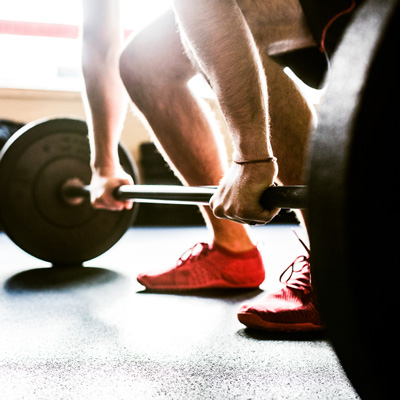Busting Plateaus
Permanent link All Posts
One of the "it" phrases in the fitness world is muscle confusion. If you stay up late enough and watch a few infomercials, you are bound to hear some meathead selling a DVD using this buzz word. I hear muscles get really confused with algebra…
In all seriousness, your muscles adapt to how you train. If you are doing the same workout day after day, your body will get used to it and suddenly you stop getting stronger, faster, leaner, etc. Eventually everyone hits a plateau, and then it's time for a change. The change can subtle or drastic. I usually make big changes because boredom sets in. A few changes you can make:
1. Slow down
2. Circuits
3. Unilateral training
Slow Down
I got a little crazy recently and confused my muscles by weight training more slowly. Normally when you are pumping iron, you throw the weight up on the faster end, albeit controlled but still quickly. My workout was similar to the Super Slow method where you bring the weight up on a 10 second count, and lower the weight the same.
I loved Super Slow training! It was a little hard on my shoulder for certain exercises, but it was an intense burn. Fun fact, this was the first method I used to train people when I was in college. The program I used was one exercise per body part, and we went to failure on each set. Here's a sample workout:
- Body weight squats
- Seated rows
- Deadlifts
- Dumbbell bench press
- Shoulder press
- Lunges
- Bicep curls
- Triceps push downs
Circuits
A circuit is a workout where you move from one exercise to another with little break. Most workout videos are done like this. A lot of bootcamps are also done in this fashion. What's great about it, is you can make every circuit different. When I design a workout like this, I use a balanced approach, i.e. for every chest exercise there should be a back exercise. Another benefit to this style is it can combine cardio training for your heart, with anaerobic training for your muscles if you don't rest between exercises. And since everyone is calorie-burning crazy these days, this workout will achieve that goal too. Here's a sample circuit:
- Assisted chin ups
- Alternating leg lunges
- Push ups
- Single leg deadlift
- Shoulder press
- Jumping jacks
- Rows
- Mountain climbers
Run from one exercise to the next. Take a 1-2 minute break when you finish all exercises, and repeat the circuit 2-4 times.
Unilateral Training
It sounds fancy, but it's just training one arm or leg at a time. If you are bicep curling, you do your left arm first and then your right arm. I like this because you can work on strength balancing. Most of us have one arm or leg that's stronger; with this type of training you can do an extra set if you need to on the weaker side. Another reason I like this type of programing is it helps with balance when you do single-leg squats, leg press and deadlifts. A kettlebell works well with this type of training. Sample program:
- Single arm row
- Single leg deadlift and bicep curl
- Single arm dumbbell bench
- Single leg squat (I would hold on to a stick, TRX, or body bar)
- Overhead triceps extension
- Lateral lunge
- Dumbbell shoulder press
Do each exercise 10 times on one side and then switch. Because it takes a while to do one side and then the other, I would only do two sets of each exercise and then move on to the next exercise.
There are millions of ways to confuse your muscles, I recommend mixing up your routine every 4-6 weeks. If you go to a gym that has classes, try a different teacher or new class. Have fun, and of course only exercise if you are healthy enough and cleared by your doctor.



